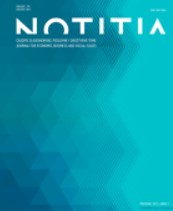The Monetary policy in the Republic of North Macedonia and Republic of Albania during 2020
The Monetary policy in the Republic of North Macedonia and Republic of Albania during 2020
Author(s): Shenaj Hadzimustafa, Hyrije Abazi-AliliSubject(s): National Economy, Supranational / Global Economy, Economic policy, Government/Political systems, Comparative politics, Health and medicine and law
Published by: Notitia d.o.o.
Keywords: monetary policy; central bank; conventional monetary tools; unconventional monetary tools;
Summary/Abstract: Globally, the COVID-19 pandemic crisis is considered as one of the worst global recessions in history, caused by non-economic factors such as the coronavirus pandemic. The pandemic crisis has increased the financial stability and vulnerability across different markets and sectors. These changes required the central banks, governments, and other authorities to take a variety of policy assistance steps to help limit immediate financial stability threats. The goal of this study is to examine how the monetary policies of the Republic of North Macedonia and Republic of Albania, as one of the two key macroeconomic policies, have reacted in response to COVID 19 for the year 2020. This study looks at how the central banks of both countries have altered conventional and unconventional monetary policy tools to combat the pandemic. The analysis is based on the data published by the monetary officials in both countries. The results show that interbank interest rates in the Republic of North Macedonia and Republic of Albania were reduced from 2.00% to 1.50% and from 1.00% to 0.50%, respectively, while overnight loan interest rates were reduced from 2.50% to 2.00% and from 1.90% to 0.90%, respectively. An overview of the unconventional measures is also presented.
Journal: Notitia - časopis za održivi razvoj
- Issue Year: 2021
- Issue No: 7
- Page Range: 109-118
- Page Count: 10
- Language: English

